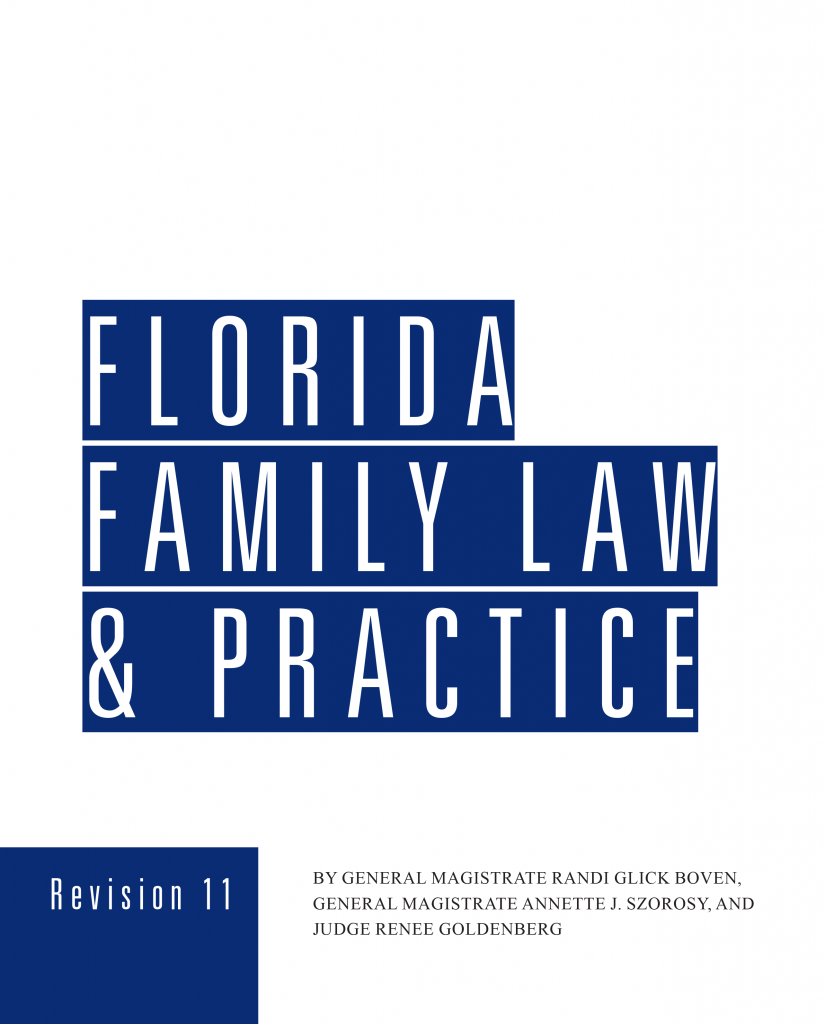Florida Family Law Trial Notebook

ISBN: 9781945421884
Annual List Price: $239
Table of Contents
- Chapter 1 Pre-Trial
- Chapter 2 Course and Conduct of Trial
- Chapter 3 Documentary Evidence
- Chapter 4 Physical Proof
- Chapter 5 Witness Competence and Disqualification
- Chapter 6 Witness Examination: Basic Issues
- Chapter 7 Witness Questioning and Answering
- Chaper 8 Science, Opinion and Experts
- Chapter 9 Alternatives to Physical and Testimonial Proof
- Chapter 10 Privileges
- Chapter 11 Hearsay Basics
- Chapter 12 Hearsay Exceptions: Declarant Unavailable
- Chapter 13 Hearsay Exceptions: Declarant Available
- Chapter 14 Character and Habit
- Chapter 15 Relevance and Materiality
- Chapter 16 Other Rules Governing Both Physical and Testimonial Proof
- Chapter 17 Substantive Family Law
- Chapter 18 Florida Family Law Rules of Procedure
- Forms
Quickly find answers to evidentiary and substantive law questions whether you are in the office or the courtroom. More than 200 summaries of recent noteworthy cases make this edition of Florida Family Law Trial Notebook invaluable for both new and experienced practitioners. Developments include:
- Incorporation of Marital Settlement Agreement into final judgment was no bar to legal malpractice action. 17.1.9
- Salary owed to wife on divorce pursuant to prenuptial agreement was not alimony. 17.1.10
- Court could not order husband’s company (a non-party) to pay wife a monthly stipend. 17.2.2
- Error to impute to wife social security income that she was eligible to receive but had deferred to receive a higher amount in the future. 17.2.17
- Error to impute income to husband when wife produced no evidence of corporate pilot positions for which husband could qualify given their equal timesharing agreement. 17.2.17
- Husband’s need for retirement that arose after parties signed MSA, but before entry of final judgment, was sufficient for court to entertain husband’s motion for modification of alimony. 17.2.21
- Where waiver of right to seek alimony modification was ambiguous, husband was entitled to seek modification. 17.2.21
- Court erred in finding husband had ability to pay wife’s attorney fees based on loan from a friend. 17.4.1
- On remand, trial court was required to conduct a need and ability to pay analysis in fixing conditionally granted appellate attorney fees. 17.4.3
- Charging lien requires that attorney’s services produce positive result for client as lien attaches to tangible fruits of services. 17.4.6
- Trial court erred in ordering former wife to pay attorney fees to former husband while making no findings regarding reasonable hourly rate or reasonable number of hours for attorney’s services. 17.4.14
- Former wife was not judicially estopped from pursuing fee award from her former husband even though the fees owed by the former wife to a law firm were discharged in bankruptcy. 17.4.31
- Life insurance policy ordered to secure child support should have named children as beneficiaries, not former wife. 17.5.34
- Husband’s obligation to pay wife half the proceeds from the sale of a business was properly characterized as a property settlement and not spousal support. 17.6.17
- In First District, it does not constitute fundamental error for a trial court to not address steps needed to be taken by a party to reestablish unsupervised parenting time if the issue is not brought to the trial court’s attention. 17.7.33
- Stock option could not be considered as both a marital asset for division and a source of income for alimony. 17.8.2
- Husband who paid down mortgage encumbering the wife’s non-marital home should be given credit for one-half of the amount by which he reduced the mortgage balance, not a dollar for dollar credit. 17.8.21
- In actions for injunctions for protection against repeat violence, dating violence, and sexual violence brought pursuant to Chapter 784.046, Florida Statutes, a trial court may award attorney’s fees in accordance with Chapter 57.105, Florida Statutes. 17.9.1
- Trial court did not abuse its discretion in not dissolving 15 year old injunction against domestic violence where petitioner testified about numerous violations and fear she would be victimized when respondent was released from prison. 17.9.1
- Trial court should not have entered an injunction for protection against stalking when only one incident of harassment was proven. 17.9.2
- Because the actions of husband’s paramour were not directed to the wife but were directed toward him, the wife should not have been granted an injunction for protection against stalking. 17..9.2
- An order requiring a psychological examination must specify the manner, conditions, and scope of the evaluation. 17.9.5
- Trial court should not have entered an injunction for protection against sexual violence based solely on what the children told their father about what their stepfather allegedly did to them. 17.9.5
- Full Faith and Credit Clause of the United States Constitution required enforcement of a sister state’s judgment ordering grandparent visitation with minor children. 17.17.9



